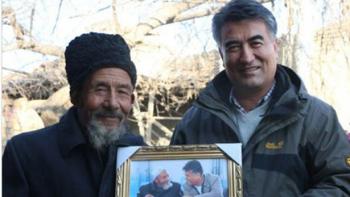Uyghur scholars and students interned or disappeared

Yojana Sharma
30 January 2019
Specific details are emerging about an alarming number of university teachers of China’s Uyghur Muslim minority identified as interned, imprisoned or forcibly disappeared in China – part of a major government crackdown on Uyghurs that has seen around 1 million detained in camps in Xinjiang province since 2017.
A new report released this week by the United States-based Uyghur Human Rights Project (URHP) notes that some 242 scholars, artists and journalists have been identified, among them “an alarming 61 university professors” and some 96 students.
But it warns that the names compiled by exiled journalists and scholars are “likely a small portion of those persecuted”.
From Xinjiang University alone, 21 have been interned in re-education camps that China likes to describe as a ‘vocational training’ exercise, says the report, noting that faculty from Xinjiang University “have been a focus for the Chinese authorities given their prominence in Uyghur-produced scholarship conducted in the region”.
Of the named students held or disappeared, almost 50 were students at Egypt’s Al-Azhar University, forced to return home in 2018, and around a dozen were students of both the Uyghur and Kyrgyz minorities in China who had been studying at Kyrgyz National University in Bishkek, the capital of Kyrgyzstan. They were ‘forcibly expelled’ by the university after they failed to return from China under threat of consequences to their families.
Forcibly disappeared
Fifteen staff members from Xinjiang Normal University, 12 from Kashgar University, six from Xinjiang Medical University, six from the Academy of Social Sciences of Xinjiang, and four from Hotan Teachers College are also known to have been interned in camps, imprisoned or have forcibly disappeared.
In a previous report released in October, UHRP gave details of some of those who had disappeared, including Rahile Dawut, a leading expert on Uyghur folklore and traditions at Xinjiang University, whose work had previously been sponsored by the Chinese state. She left Urumchi for Beijing in December 2017 and has not been heard from since.
The names of Kashgar University’s president, Erkin Omer, the vice president Muhter Abdughopur, and professors Qurban Osman and Gulnar Obul have been deleted from the institution’s website and their whereabouts are unknown.
Halmurat Ghopur, president of the Xinjiang Food and Drug Administration’s Department of Inspection and Supervision and former president of Xinjiang Medical University Hospital, has been detained in an undisclosed location since November 2017. Former president of Xinjiang University, Tashpolat Tiyip, has reportedly received a heavy sentence on ‘separatism’ charges.
Collating figures
UHRP, in its latest report, has attempted to collate figures for detained and disappeared scholars and intellectuals. “The absolute number is rising. As it is very difficult to get information from Xinjiang, the information on Uyghur intellectuals has been trickling out and we have been making an effort to keep a running tally of people detained and disappeared,” said Nicole Morgret, UHRP project coordinator in Washington DC.
UHRP has added more than 107 names since their October report. “These are not necessarily people who were detained or interned in the past few months but whose names have come to light via their relatives and other sources,” said UHRP researcher Henryk Szadziewski.
The vast majority could not be described as vocal opponents of the authorities or dissidents, Szadziewski told University World News. “These are not individuals who were fundamentally opposed to Chinese government policy in the region. Rather they have kept their heads down and employed ‘survival strategies’ in a very repressive environment,” he said.
At Kashgar University, where Szadziewski worked in the past, the authorities “are picking up certain people and these have been quite loyal administrators and academics. First they disappeared from the university website as employees and then they disappeared themselves,” Szadziewski said.
The scale of repression in Xinjiang has shown that “it does not matter if you are loyal or not [to the Communist Party]”, Szadziewski added. “It’s very clear that intellectuals are being targeted.”
“Intellectuals represent the repository of cultural and scientific knowledge of a people, and in order to break the ethnicity you need to break ethnic life,” he said.
The persecution of the staff of the few remaining Uyghur-language publishing outlets is clear evidence of the campaign to eradicate learning and scholarship in the Uyghur language. At least 15 Uyghurs at the Xinjiang Educational Press and 14 current and former employees of Kashgar Uyghur Press have been interned or otherwise punished.
Plea to overseas universities
According to UHRP, universities overseas should suspend all cooperation with the Ministry of Education and the Hanban (Confucius Institute Headquarters) until the government releases all persecuted intellectuals, artists and journalists; enables them to be reunited with their families, including children who have been forcibly taken to state orphanages; makes restitution; and brings their persecutors to justice.
It also called on governments and private foundations to provide scholarships and fellowships for Uyghur students and scholars abroad “who cannot return home due to the grave risk of detention, torture and death in custody”.
Colleges should waive tuition fees for enrolled students who cannot pay due to losing contact with their families, it said.
